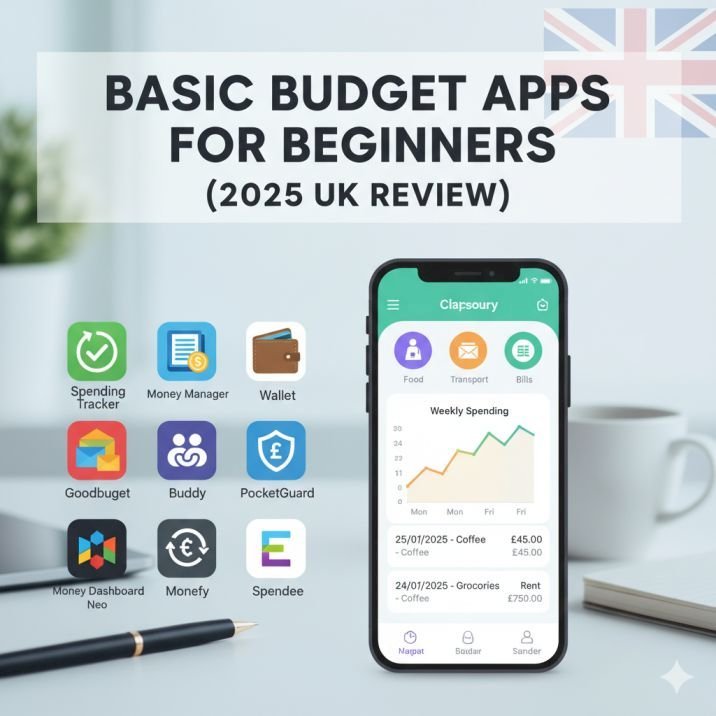Basic Budget Apps for Beginners 2025 (UK Review)
Explore the best basic budget apps for beginners in the UK. Learn how simple budgeting tools work, who they suit, and which apps are worth trying in 2025.

Basic budgeting apps are simple money-tracking tools that help users record daily expenses, organise spending categories and review habits without learning complex finance systems. They are useful for anyone who wants practical spending awareness using a phone instead of spreadsheets. This guide outlines what these apps do and highlights trusted options for UK users in 2025.
Budgeting has become an essential skill as digital payments, online purchases and subscription-based services influence everyday spending patterns across the UK. Not everyone wants or needs advanced financial software, and many simply prefer a clean, reliable way to record regular expenses and stay aware of how money is used. Basic budgeting apps offer a practical solution by providing easy-to-use features designed to simplify tracking without technical language or finance-based decision tools. In this guide, you will learn how basic budgeting apps work, who can benefit most from them and which user-friendly apps are commonly recognised among UK users in 2025.
What a basic budgeting app is designed to do
A basic budgeting app offers a straightforward way to record spending, add income where necessary, categorise transactions and review general financial behaviour over time. These apps avoid advanced dashboard systems and instead focus on delivering clarity through simple screens and easy navigation. Most of them operate manually, allowing users to log each expense themselves, which naturally increases money awareness and personal accountability. Because they are simple by design, they suit people who do not want subscription-style budgeting systems or technical analysis tools, and instead want something easy to maintain daily.
Who benefits the most from using basic budgeting apps
People often turn to budgeting apps for different reasons, but the most common users include students, young professionals, families, shared households and adults who prefer manual, diary-style budgeting. These apps are also ideal for those who wish to avoid linking bank accounts or storing information online. Older adults who are familiar with traditional budgeting notebooks often find these tools easy to adjust to, since many are structured in a similar way. Basic budgeting apps are not designed for investment planning or debt restructuring, but they work well for people who simply want a reliable record of their spending without distraction.
Popular basic budgeting apps used by UK users in 2025
Spending Tracker
Image source: googleusercontent.com
Spending Tracker is designed for users who prefer full manual control. It displays expenses using timeline-style views and allows tracking by day, week or month. It does not require account creation, which supports privacy-focused users and those who want a no-pressure digital diary. It is best suited for beginners, offline users and individuals who want a low-maintenance budgeting routine. The limitation is that those who later want advanced features may find it too simple, but for its purpose, it remains highly practical.
Money Manager: Expense & Budget
Image source: googleusercontent.com
Money Manager offers a structured, ledger-style layout with a calendar view that helps individuals and families compare spending easily. The charts support visual understanding without feeling technical. It is especially useful for people who enjoy traditional record-keeping and appreciate organised entries. Users who expect a modern design or more automation may find it slightly conventional, but for those who like neat organisation, it is a strong choice.
Wallet (BudgetBakers)
Image source: gstatic.com
Wallet gives users a flexible experience, allowing them to start with manual tracking and gradually explore more features if required. Spending reports are clear and easy to interpret, making it useful for people who plan to build budgeting skills over time. Those who prefer to remain offline can do so, while others have the option to expand into cloud features later.
Goodbudget
Image source: gstatic.com
Goodbudget uses an envelope-style planning system, which means spending categories are assigned budgets before spending begins. It helps users stay disciplined and is ideal for people who prefer planned spending rather than reactive tracking. Couples and shared-living users often find it helpful. Those who prefer spontaneous entry rather than predictive planning may find it more structured than necessary.
Buddy

Image source: pinterest.com
Buddy offers a clean, modern layout and can be used individually or with someone else, making it suitable for partners or shared homes. It helps to maintain transparency when managing common expenses and suits users who want a neat and visually appealing budgeting space. Those seeking fully offline tools may prefer alternatives, but its shared features stand out.
PocketGuard
Image source: googleusercontent.com
PocketGuard provides insights into how much money may remain after expected expenses, helping users avoid overspending. Manual tracking remains an option, making it useful for UK users who prefer not to link bank accounts. It suits people who want a realistic idea of available spending funds rather than detailed tracking.
Monefy
Image source: googleusercontent.com
Monefy focuses on fast entry with an icon-based interface. It works well for users who want quick daily input without navigating multiple screens. Its simplicity may not satisfy those who want detailed breakdowns, but it is excellent for busy routines and straightforward budgeting.
Spendee
Image source: googleusercontent.com
Spendee offers a colourful, visually friendly layout and allows separate budgeting groups. It works particularly well for those who want to track themed budgets such as travel, events or household management. While advanced features may require an upgrade, the basic functions are easy to learn and helpful for day-to-day planning.
Emma
Image source: googleusercontent.com
Emma is UK-developed and provides visibility over spending and subscription services. It can help users identify regular charges that may otherwise go unnoticed. It includes more features than a typical basic app, but can still be used simply, making it suitable for anyone who wants clear spending explanations without needing to analyse data themselves.
Money Dashboard Neo
Image source: gstatic.com
Money Dashboard Neo helps users view how spending habits are distributed across categories in a clear, structured layout. Because digital finance platforms evolve over time, users should check its current availability before downloading. It suits people who want broader spending insight without turning to complex personal finance software.
If you would like to explore more highly rated budgeting tools, including those with advanced features and stronger review scores, you may also find this comparison helpful: best-rated budgeting apps in the UK
Choosing the right budgeting app
The ideal budgeting app is not necessarily the one with the most features, but the one a user can maintain consistently. Decisions should be based on comfort level, habits, privacy preferences and how a person prefers to view information. Some people enjoy diary-style recording, while others prefer visual charts or shared access. Trying an app for at least a week is often the most reliable way to judge whether it fits smoothly into daily life.
Building a practical budgeting routine
Start by listing essential monthly expenses such as rent, food, travel and bills, then track smaller day-to-day purchases. Many people realise that unplanned spending happens in small amounts that go unnoticed unless recorded. Reviewing spending once a week makes it easier to adjust than waiting until the month ends. Budgeting should support better choices, not impose unrealistic restrictions.
Conclusion
A basic budgeting app can help increase financial awareness without the complexity of full money-management software. It is intended for clarity, not expert planning. Whether used for a few months or over several years, it can guide users towards more informed spending decisions. Consistency matters more than the specific app chosen, and the best results come from honest use and regular review.
Frequently Asked Questions (FAQs)
1. What is the simplest budgeting app to use in 2025?
Spending Tracker and Monefy are often considered among the simplest because they rely on manual entry and have straightforward layouts without advanced setup.
2. Which budgeting app is best for beginners in the UK?
Apps like Spending Tracker, Money Manager and Wallet are user-friendly for beginners who want to start with basic manual tracking without detailed financial tools.
3. Is there a free budgeting app that works well in the UK?
Yes. Many basic apps, including Spending Tracker, Money Manager, Monefy and Spendee have free versions with enough features for everyday budgeting.
4. Do I need to link my bank account to use a budgeting app?
Not necessarily. Several apps allow complete manual use without bank linking, which suits users who prefer privacy or offline tracking.
5. Which budgeting app is good for couples or shared expenses?
Buddy and Goodbudget are commonly used for shared budgeting because they allow joint planning and clear category allocation.
6. How do basic budgeting apps help with saving money?
They help users understand spending patterns, spot unnecessary expenses and create more mindful spending habits, which may support improved savings decisions over time.
7. Can I use these budgeting apps on both Android and iOS devices?
Most of the apps listed are available on both platforms, but it’s best to check the official store listing for your device before downloading.
8. Are budgeting apps safe to use?
Safety depends on the app’s privacy policy, data storage method and whether account linking is optional or required. Users who prefer privacy can choose manual-only apps.
9. What’s better: manual budgeting or automatic syncing?
Manual budgeting increases awareness and encourages mindful recording, while automatic syncing offers convenience. The best method depends on personal preference and comfort level.
10. Can a budgeting app replace spreadsheets?
Yes, for many users it can. Budgeting apps offer quicker daily input, mobile access and category summaries, making them more practical for routine use.

 AnniWeston
AnniWeston 











